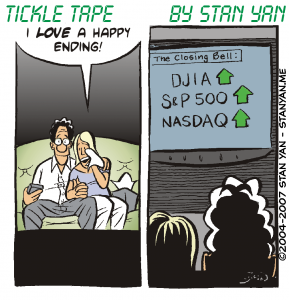Have you ever been caught off guard in the midst of a trade? In an instant, you may lose control of your emotions? It may not happen all the time, but it does happen. Consider the basic scenario. You may have thought you had a well-developed trading plan. You executed it, monitored the markets, and suddenly, it all went wrong. You became agitated. You could no longer think straight.
You were caught off guard, and thrown into a state of anxiety and panic. When things don’t go your way, it’s easy to feel frustrated and disoriented. In a sense, there is little you can do but acknowledge that you have lost control and that you better struggle to minimize the damage. Our brains are wired for primitive responses, and this faulty wiring can throw us off balance at times.
Just like wild animals, when things don’t go our way, our thinking gets cloudy, and we instinctively try to take physical action, such as fighting an opponent or running away. But when trading the markets, this is not an optimal strategy. What we need to do, and may have trouble doing in a panic state, is think clearly, rationally, and take appropriate action. In an extreme state of panic, though, you will not be able to think logically enough to think on your feet and make an astute midcourse correction. There are steps you can take, however, to deal with an unexpected, panic state with grace.
First, planning ahead, and working under the assumption that things go wrong, helps. Getting caught off guard is often the main precursor to a state of panic. If you are caught off guard and start to panic, you will have difficulty gaining your composure and acting rationally. The best protection is to assume that adverse events may happen. Don’t fool yourself into thinking you are immune from things going wrong. Bad things do happen to good traders. How do you prepare for adverse events? Don’t trade with a vague trading plan. Consider all possible adverse events, and consider how the price may move in ways that you had not anticipated. Specify the signals that will tell you at what point you should logically abandon your plan.
Outline the plan in as much detail as possible, when you will enter, when you will exit, and indicators you will look at to determine how well the markets are behaving according to plan. If you have a well-defined plan, you can react decisively even during a panic state. If a plan is well formulated, then it’s easy to follow, even in times of extreme uncertainty and stress. By having a well-defined trading plan, you can follow it even when you are frustrated and agitated. And if you can follow your plan, you’ll minimize the damage that a panic state can cause.
A second major precaution is risk management. If you risk money you can’t afford to lose, the stakes will be too high and you’ll know it. You’ll feel on-edge as if something bad is about to happen. If you manage risk, though, you’ll know deep down that you are safe even when the market moves against you. You’ll feel more at ease, and be able to instinctively think, “I’m protected. Just calm down, and follow the plan. I’ll survive.”
Trading can be stressful at times. An unexpected adverse event, or seemingly erratic market action, can throw you off balance. And once you are knocked off balance, it’s hard to regain your composure. You won’t know what to do. Don’t wait to be caught off guard before taking action. When you are thrown off balance, you may not recover fast enough, but if you trade with a detailed trading plan that you can easily follow even in the midst of a state of panic, and if you have carefully managed risk, you will be able to gain some emotional control, and minimize the damage. Don’t wait until it is too late. Take action before the markets catch you off guard.


